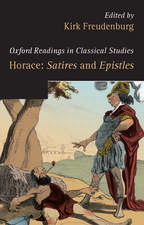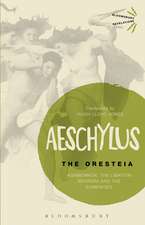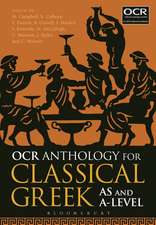Satires of Rome: Threatening Poses from Lucilius to Juvenal
Autor Kirk Freudenburgen Limba Engleză Paperback – 24 oct 2001
| Toate formatele și edițiile | Preț | Express |
|---|---|---|
| Paperback (1) | 339.57 lei 6-8 săpt. | |
| Cambridge University Press – 24 oct 2001 | 339.57 lei 6-8 săpt. | |
| Hardback (1) | 441.13 lei 6-8 săpt. | |
| Cambridge University Press – 24 oct 2001 | 441.13 lei 6-8 săpt. |
Preț: 339.57 lei
Nou
Puncte Express: 509
Preț estimativ în valută:
64.99€ • 67.59$ • 53.65£
64.99€ • 67.59$ • 53.65£
Carte tipărită la comandă
Livrare economică 14-28 aprilie
Preluare comenzi: 021 569.72.76
Specificații
ISBN-13: 9780521006217
ISBN-10: 052100621X
Pagini: 308
Dimensiuni: 153 x 228 x 18 mm
Greutate: 0.49 kg
Ediția:New.
Editura: Cambridge University Press
Colecția Cambridge University Press
Locul publicării:Cambridge, United Kingdom
ISBN-10: 052100621X
Pagini: 308
Dimensiuni: 153 x 228 x 18 mm
Greutate: 0.49 kg
Ediția:New.
Editura: Cambridge University Press
Colecția Cambridge University Press
Locul publicării:Cambridge, United Kingdom
Cuprins
Introduction; 1. Horace; 2. Persius; 3. Juvenal.
Recenzii
'No review can do full justice to the wealth of sophisticated and provocative ideas put forth in this volume with remarkable clarity of expression and unfailing wit'. Costas Panayotakis, Classical Review
'Substantial interpretative claims, contrary to what we might call received opinion, but nonetheless convincing, underpin each chapter.' David Larmour, Classical Philology
'There are many good points to this book, not the least of which is its bold confrontation with standard accounts of satire that seek to smooth out the genre's glaring contradictions. By examining poetic failure rather than success, by focusing on the audience rather than the author, and by making us aware of what is lacking amid all the fullness, F. compels us to think differently about Roman satire and our readings of it. The overarching proposition that we can connect the anxiety about genre and self-expression visible in satire with broader crises in identity and self-formation among educated Romans of the early empire is entirely persuasive...This book is a substantial contribution to the scholarship on Roman satire and will be welcomed on that basis. The numerous question marks and underlinings in my own copy testify to the fact that it was at least a remarkably provocative read.' David Larmour, Classical Philology
'The specialist in Roman satire will … find some interesting ideas herein.' Classics Ireland
'Professor Freudenburg's book, yet another in the series devoted by scholars over the years to such a visibly important genre, is welcome … The book will clearly be useful in the modern seminar-room, where it should generate much animated discussion.' Comptes Rendus
'Substantial interpretative claims, contrary to what we might call received opinion, but nonetheless convincing, underpin each chapter.' David Larmour, Classical Philology
'There are many good points to this book, not the least of which is its bold confrontation with standard accounts of satire that seek to smooth out the genre's glaring contradictions. By examining poetic failure rather than success, by focusing on the audience rather than the author, and by making us aware of what is lacking amid all the fullness, F. compels us to think differently about Roman satire and our readings of it. The overarching proposition that we can connect the anxiety about genre and self-expression visible in satire with broader crises in identity and self-formation among educated Romans of the early empire is entirely persuasive...This book is a substantial contribution to the scholarship on Roman satire and will be welcomed on that basis. The numerous question marks and underlinings in my own copy testify to the fact that it was at least a remarkably provocative read.' David Larmour, Classical Philology
'The specialist in Roman satire will … find some interesting ideas herein.' Classics Ireland
'Professor Freudenburg's book, yet another in the series devoted by scholars over the years to such a visibly important genre, is welcome … The book will clearly be useful in the modern seminar-room, where it should generate much animated discussion.' Comptes Rendus
Notă biografică
Descriere
Provides a complete and socially and politically contextualised survey of Roman verse satire.

















